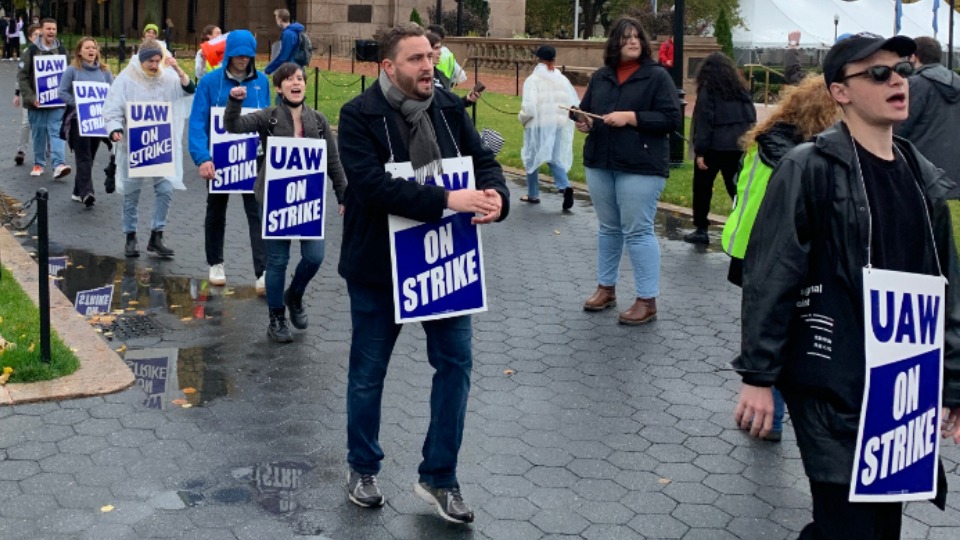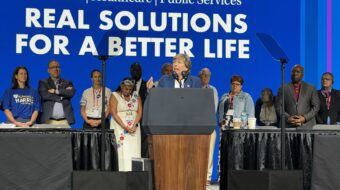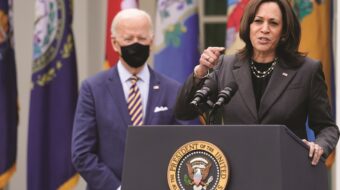
NEW YORK—From the recent Amazon organizing efforts on Staten Island to the successful contract that NYC Taxi Drivers won after a two-week-long hunger strike, it’s clear that New York is becoming a primary battleground for what the AFL-CIO has called #Strikesgiving and perhaps even a “Strikesmas” after a productive Striketober. From Chipotle workers to Columbia graduate student workers, the ground is being laid for more victories like the recent triumph for safe-staffing for nurses in Buffalo.
Chipotle stores struck
Fast food workers at four Chipotle stores in NYC also went on strike during #Striketober, with support from 32BJ SEIU. On October 1st, Chipotle workers at the Queens Center mall walked off the job, demanding compensation for more than one week of lost income due to flooding from Hurricane Ida.
On the last week of October, they struck against the boss in three more stores in midtown Manhattan, Washington Heights, and the Bronx over safety issues and massive violations of NYC’s Fair Workweek laws, including last minute schedule changes with no option to refuse, and evading the legally mandated premium pay for those changes. (Fast food workers in NYC have the right to get their schedule at least two weeks in advance). Workers also demanded an end to understaffing and overwork, general mismanagement and disrespect, and other problems endemic to the company.
While the CEO makes $18,000 per hour, workers earning $17 per hour are squeezed to the max. Before unionization efforts began, Chipotle workers in NYC were making minimum wage.
Young people, including many students, are among those targeted for super-exploitation by the fast food industry. Disproportionate numbers of Black and brown workers, women workers, and immigrant workers of all ages, however, are also paid minimum wage while feeding those of us needing a quick bite on our way to work, on our lunch break, or while traveling.
While the industry has tried to claim these jobs are just “pocket money” for young people in school, the low pay and high stress environment is no way to support students. And it’s certainly not “pocket money.” So far this year, the fast food industry raked in more than $296 Billion in the US alone.
Columbia strike second largest in country
In what is now the largest strike taking place in the United States after John Deere, Columbia University graduate student workers have taken to picket lines demanding their first (and fair) contract.
Dominic Walker, a 30-year-old fifth-year Ph.D. student of sociology at Columbia, stated, “For me personally, I’ve been connected to the fight for a while. I started the bargaining committee in 2019 when we first started demanding a contract which was put on hold by the pandemic.”
While the pandemic may have put a damper on the organizational morale of these graduate students, Walker told People’s World that many argued a strike was even more necessary given the outbreak of the pandemic and the closure of the campus. “We were initially demanding more years of appointments for Ph.D. students to finish their dissertations with an income which was even more necessary to win given the onset of the pandemic.” In April 2020, graduate student workers at Columbia won an extra $1500 to their stipends in what is now known as the “small strike.”
Nearly a year later, the bargaining committee felt that Columbia was still trying to exclude graduate student workers from the contract in addition to cutting out a few important benefits such as a mutual arbitrator to deal with sexual harassment in addition to higher stipends ($2000 to $6000), better health benefits (vision/dental and lower premiums), childcare for Ph.D. students and that all NLRB students be recognized in the contract. The university offered 2% increases to stipends but since the workers were now paying union dues, it was effectively a pay cut, hence why the contract offered in the Spring of this year was voted down.
The United Auto Workers, which has recently organized graduate student workers at NYU and the New School, partnered with Columbia organizers as part of the same local. The university has since stalled and avoided going into negotiations. Columbia argues that the demands for a contract are “too much” since those who are pushing for them are “students and not workers,” says Walker. “That’s how they are able to take away benefits that would generally be in a worker contract like violations against harassment and discrimination.”
When asked about the unionization process being a radicalizing experience for the young workers and students, Walker replied, “We have open sessions in the bargaining process which are still on Zoom due to the pandemic, and people tune in to see a lawyer that’s paid over $1000 an hour to tell us that we don’t deserve healthcare from the university, so yes, it’s a radicalizing process.”
Another student worker, Joanna, told People’s World, “It was just told to us that Columbia made record high profits this year during a pandemic while all of us struggle. I mean, so many of us struggle to pay our rent; so many of us have gotten sick, and we’re not able to pay our medical bills due to the pandemic because our out-of-pocket maximum is like $3,000.”
Joanna continued, “It’s just absurd that while Columbia keeps getting richer as an institution, the people who basically make it run—we make it function; we teach and research essentially as cheap labor for the university—we don’t get these basic things that we should have as workers, so that’s why we’re out on strike.”
She said, “I would say that most immediately, during the pandemic a lot of us really struggled to pay our rent because of the way we are only paid $35,000 a year.” Joanna said that usually, students leave the city during the summer and then sublet their apartments as a way of earning money. “I’m an international student, so I would go home or something and then sublet my apartment. But it was impossible during the pandemic because we had to shelter in place, there was no travel possible, people couldn’t go back home. This is at the peak of the pandemic—March 2020—and a lot of us just couldn’t pay our rent, so we went on a rent strike. It speaks to …the fact that we get paid so little by the university and then pay more than half of that back to the university.”

Riga, a sixth-year Ph.D. student in East Asian Studies and History told People’s World, “As an international student, I know firsthand the ramifications of Columbia’s failures to address these three key areas of concern that the unit is currently bargaining for. Columbia does not pay its graduate students, MA students who are language teaching appointments, undergraduate students, teaching assistants, and research assistants…they don’t pay them a fair living wage in accordance with cost of living in New York City.”
Columbia also doesn’t provide adequate health care coverage for many students and their dependents. Riga knows many people who have gone deeper into debt because Columbia coverage does not provide them adequate resources to deal with their health conditions.
Jesse Kling, another striking student worker, reported, “We’re trying to get a living wage for student workers across Columbia. As well as comprehensive health benefits. And neutral arbitration for victims of sexual assault and discrimination. Getting the NYPD off campus. All things that I think are extremely important for making their livelihoods being a part of this university.”
Kling said, “I’ve always felt very strongly about organized labor and the power of workers to determine their future and the security of their positions.”
Columbia graduate student workers march on a picket line Monday to Friday from 10 a.m.2 p.m. and post updates about the progress of the strike on Instagram and Twitter.












Comments